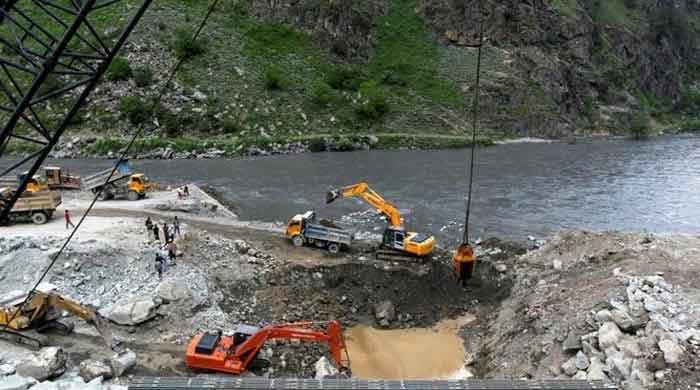INDIAPOSITIVE
ELITE MEMBER

- Joined
- Sep 20, 2014
- Messages
- 9,318
- Reaction score
- -28
- Country
- Location
Excavators are being used at the dam site of Kishanganga power project in Gurez, Srinagar, June 21, 2012. — Reuters/File
ISLAMABAD: Pakistan has carefully responded to India's notice sent on Indus Waters Treaty (IWT) 1960, saying it was ready to listen to New Delhi’s concerns at the level of the Permanent Commission of Indus Waters (PCIW), The News reported citing sources in attorney general’s Office.
India earlier issued a notice to Pakistan on January 25, seeking modifications in the treaty two days before the hearing of the Court of Arbitration in The Hague that took place on January 27-28. India had extended the notice by invoking Article 12 of the treaty.
The officials said Pakistan was ready to listen to Indian concerns on the treaty at the level of the Permanent Commission of Indus Waters (PCIW). They said Pakistan was a lower riparian country while India is upper riparian and the lower riparian country couldn’t flout the Indus Water Treaty’s provisions or commit any material breach.
The officials also said that the decision about the parleys on changes to the treaty will be taken once Pakistan heard India’s concerns at the PCIW level.
However, they said under Article 12 of the treaty, the existing treaty will continue to reign unless the parties to the dispute — Pakistan and India — bilaterally introduce changes to the pact.
The sanctity of the existing Indus Waters Treaty cannot be damaged between the two nuclear countries as the whole world cannot afford it, the official said, adding that Pakistan did not commit any material violation of IWT, which is why the Indian notice to introduce changes to IWT is uncalled for.

 www.geo.tv
www.geo.tv
- Decision to be taken once Pakistan hears concerns at PCIW level.
- Officials say IWT's sanctity cannot be damaged.
- Existing treaty will be in place unless changes are introduced bilaterally.
ISLAMABAD: Pakistan has carefully responded to India's notice sent on Indus Waters Treaty (IWT) 1960, saying it was ready to listen to New Delhi’s concerns at the level of the Permanent Commission of Indus Waters (PCIW), The News reported citing sources in attorney general’s Office.
India earlier issued a notice to Pakistan on January 25, seeking modifications in the treaty two days before the hearing of the Court of Arbitration in The Hague that took place on January 27-28. India had extended the notice by invoking Article 12 of the treaty.
The officials said Pakistan was ready to listen to Indian concerns on the treaty at the level of the Permanent Commission of Indus Waters (PCIW). They said Pakistan was a lower riparian country while India is upper riparian and the lower riparian country couldn’t flout the Indus Water Treaty’s provisions or commit any material breach.
The officials also said that the decision about the parleys on changes to the treaty will be taken once Pakistan heard India’s concerns at the PCIW level.
However, they said under Article 12 of the treaty, the existing treaty will continue to reign unless the parties to the dispute — Pakistan and India — bilaterally introduce changes to the pact.
The sanctity of the existing Indus Waters Treaty cannot be damaged between the two nuclear countries as the whole world cannot afford it, the official said, adding that Pakistan did not commit any material violation of IWT, which is why the Indian notice to introduce changes to IWT is uncalled for.

Pakistan ready to listen to India's concerns on Indus Waters Treaty
Decision to be taken once Pakistan hears concerns at PCIW level. Officials say IWT's sanctity cannot be damaged. Existing treaty will be in place unless changes are introduced bilaterally.



